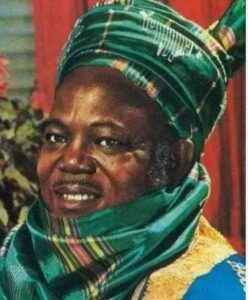

,,,,,A true story of integrity from Northern Nigeria’s golden era.

By Akioyamen Josephine.
(C) Encyclopedia Africa.
It was a calm morning in the early 1960s when Sir Ahmadu Bello, the Sardauna of Sokoto, decided to pay a short visit home. Not by road, not by rail, but through the skies aboard one of the Northern Region government’s modest Cessna aircraft.
This was not just any journey. Sokoto was his birthplace, his power base, and the heart of the Caliphate founded by his great-grandfather, Usman dan Fodio. The Sardauna was both Premier of the Northern Region and a prince of Sokoto. So in essence, he was using government property to visit his own palace.
He arrived on the tarmac dressed in his signature flowing white agbada, turban perfectly wrapped, and an easy smile on his face. “To Sokoto,” he told the pilot. “Home calls.”
The Invoice Nobody Wanted to Send
The flight went well. But in the Ministry of Works and Transport back in Kaduna, the Aviation Department soon noticed something unusual in the flight log. The entry read: Passenger, Premier Ahmadu Bello. Destination, Sokoto.
A young clerk squinted at the line and frowned.
“This trip does not look official,” he murmured. “We may need to issue a bill.”
The office fell silent. A bill? For the Premier? Whispers spread among the staff.
“Can we really do that?” someone asked.
Another clerk replied, “The regulation says all non-official flights must be paid for. Regulation is regulation.”
After some nervous debate, they did what integrity required. The invoice was typed, stamped, and sent through the proper channels until it landed on the Sardauna’s desk.
A Laugh, a Lesson, and a Cheque
When Sir Ahmadu Bello opened the envelope, he read the document quietly, then chuckled.
“So,” he said, smiling, “I must pay government for using its plane to visit my own people?”
His secretary nodded respectfully. “Yes, sir. The Aviation Department says it was not an official trip.”
The Sardauna paused, nodded, and said, “Good. That means the system is working.”
He reached for his cheque book, filled in the amount, and signed. It was a small act of honesty, but it sent a message that echoed across generations.
The Lesson That Never Aged
And so, the Premier of the Northern Region, Prince of the Caliphate, and one of Nigeria’s founding fathers, became the only leader known to have paid his own government for flying home.
Somewhere, perhaps buried deep in the archives of Kaduna, that single invoice might still exist. A fragile piece of paper carrying a powerful story about integrity, humility, and the meaning of public service.
Historical Note
The story of Sir Ahmadu Bello’s self-paid Cessna flight has appeared in several historical and journalistic accounts of his leadership. However, no official flight log or invoice has been discovered in public archives. The Northern Region government operated small Cessna aircraft in the early 1960s for administrative travel. Until primary documents surface from repositories like Arewa House or the National Archives in Kaduna, this event remains an anecdote cherished for its moral truth and historical spirit.
Moral of the Story
Accountability is not about position or power.
It is about principle.
If the Sardauna of Sokoto could pay for his own flight, then no one is too big to respect the rules.


